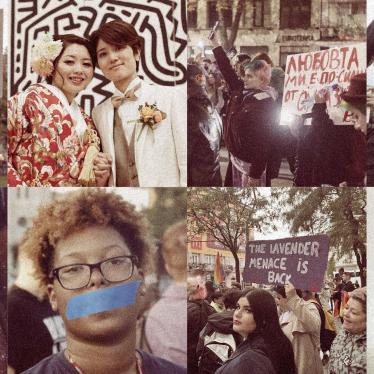(New York) - Malaysian Prime Minister Abdullah Badawi should immediately advise Malaysia’s king to establish a Royal Commission of Inquiry into the use of force by the police against a peaceful rally for electoral reforms, Human Rights Watch said today.
On November 10, the Coalition for Clean and Fair Elections (Bersih) held a march in Kuala Lumpur despite having been denied a police permit. Police responded by using chemical-laced water and tear gas to disrupt the orderly and peaceful marchers. Police also beat several retreating demonstrators; some needed medical attention afterwards. At the time, the marchers were proceeding to the Royal Palace to deliver a memorandum to Malaysia’s king requesting his support for electoral reforms.
Prime Minister Badawi expressed his approval of the way the police handled the protest. The New Straits Times quoted him saying, “I have left it to the police and they handled it very well and I am very happy.”
“If there was any doubt that the prime minister is more worried about political power than political rights, it was washed away with his defense of police actions against the marchers,” said Brad Adams, Asia director at Human Rights Watch. “Badawi’s remark was as good as saying outright that he condoned violence against political critics. He should rectify this impression by immediately calling for a Royal Commission to independently examine the facts.”
The police force had mounted a comprehensive two-day effort to prevent the rally, setting up roadblocks, snarling traffic, and strictly limiting access to central Kuala Lumpur. However, tens of thousands managed to find their way to meeting points to participate in what became the largest rally in the country in nearly a decade. The organizers of the event had contested the authorities’ denial of a police permit.
According to witnesses, such as monitors from the Malaysian Bar Association and reporters along the route, the marchers heeded the organizers’ appeals for order and peace. These observers agreed that police actions, including physical attacks on participants and journalists, were unprovoked and unwarranted.
With Merdeka Square, the site chosen for the rally, closed to demonstrators, groups of marchers assembled at several different points before proceeding to the Royal Palace. Marchers did not challenge the police. When police, banging their riot shields, moved in formation toward them, the marchers retreated. However, in one location along the route, police deployed tear gas and cannons spewing chemical-laced water without giving warning or prior orders for the demonstrators to disperse. Police officers also kicked and beat at least seven people. Several, including one man who suffered a broken leg, required hospital treatment.
Human Rights Watch further urges that no action be taken against the rally’s organizers for defying the police ban. Under Malaysia’s constitution as well as international human rights law, Malaysians have the rights to free expression and peaceful assembly. Four of the organizers, all leaders of opposition political parties, have been summoned for police questioning on Thursday, November 15, in response to a complaint that Bersih is an illegal organization. The Criminal Procedure Code mandates their appearance for questioning, but all have the right to remain silent. Until now, no leader from any of the more than 60 nongovernmental and civil service organizations that form the Bersih coalition has been summoned for questioning.
In addition, Human Rights Watch urged Police Inspector-General Musa Hassam to recommend that no charges be filed against the 34 people arrested during the march. They are obliged to report to the police in late November to learn what charges they may face. When detained, some of the 34 requested meetings with lawyers, but none were permitted access to available legal counsel.
Police officers refused to allow members of the Malaysian Bar’s Urgent Arrest Lawyer’s Team, who were standing by to assist detainees, to meet with any of the 34. They also denied the lawyers’ requests for information about the proceedings and the possible charges. When the lawyers forced their way into the police station, they were only able to speak with officers not involved in questioning the 34 or in taking their statements. All those arrested were released on their own recognizance before midnight on the day of the march.
“Where were the attorney general and the chief of police while the bookings were going on?” said Adams. “They haven’t expressed any concern over officers blatantly ignoring Malaysia’s own Criminal Procedure Code.”
According to article 28A of the Criminal Procedure Code, “a police officer shall before commencing any form of questioning or recording of a statement from the person arrested, inform the persons that he may communicate…and consult with a legal practitioner of his choice.” The article states that, if the person decides in the affirmative, the consultation with a lawyer must take place before the police proceed any further.
Human Rights Watch also faulted Police Inspector-General Musa’s recommendation that the parents of 18 children detained during the march be charged with endangerment.
In preparations for elections that are expected in early 2008, Bersih has campaigned for procedures to prevent duplicate voting, the purging of alleged phantom voters from the electoral rolls, and equal access by all parties to state-run media. State media outlets heeded the government’s initial suggestion that they ignore the event. When government officials recognized that the demonstration was making international headlines, however, they turned on the foreign press for not airing the government’s side of the story.
Information Minister Zainuddin Maidin went so far as to single out Al-Jazeera’s live coverage of police violence. He accused the network of joining an opposition anti-government conspiracy, and intimated retaliation.
“The story isn’t over,” said Adams. “The police inspector-general has warned the rally’s organizers that police will call them to account for defying police directives and threatening social order. It would be far better if the government would call its own officers and leaders to account for violating the internationally recognized rights to free expression and assembly.”







